英语情态动词讲解及练习(附答案)
【英语】情态动词练习题含答案及解析
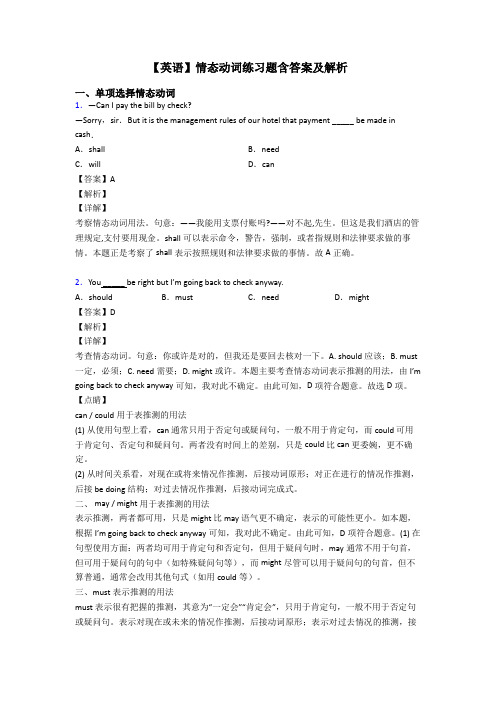
【英语】情态动词练习题含答案及解析一、单项选择情态动词1.—Can I pay the bill by check?—Sorry,sir.But it is the management rules of our hotel that payment _____ be made in cash.A.shall B.needC.will D.can【答案】A【解析】【详解】考察情态动词用法。
句意:——我能用支票付账吗?——对不起,先生。
但这是我们酒店的管理规定,支付要用现金。
shall可以表示命令,警告,强制,或者指规则和法律要求做的事情。
本题正是考察了shall表示按照规则和法律要求做的事情。
故A正确。
2.You _____ be right but I’m going back to check anyway.A.should B.must C.need D.might【答案】D【解析】【详解】考查情态动词。
句意:你或许是对的,但我还是要回去核对一下。
A. should应该;B. must 一定,必须;C. need需要;D. might或许。
本题主要考查情态动词表示推测的用法,由I’m going back to check anyway可知,我对此不确定。
由此可知,D项符合题意。
故选D项。
【点睛】can / could用于表推测的用法(1) 从使用句型上看,can 通常只用于否定句或疑问句,一般不用于肯定句,而could 可用于肯定句、否定句和疑问句。
两者没有时间上的差别,只是could 比 can 更委婉,更不确定。
(2) 从时间关系看,对现在或将来情况作推测,后接动词原形;对正在进行的情况作推测,后接 be doing 结构;对过去情况作推测,后接动词完成式。
二、 may / might用于表推测的用法表示推测,两者都可用,只是 might 比 may 语气更不确定,表示的可能性更小。
英语情态动词专项练习题及答案详解含答案解析

英语情态动词专项练习题及答案详解含答案解析一、初中英语情态动词1.The girl riding a horse there be Shirley. Her left leg was badly hurt in an accident yesterday.A. needn'tB. may notC. can'tD. mustn't【答案】C【解析】【分析】句意:那边骑马的女孩不可能是雪莉。
她的左腿在昨天的事故中受了重伤。
A.needn't不必;B. may not不可以;C. can't不可能,表示否定的推测;D. mustn't 不准,不允许,表示禁止。
本题表示否定的推测,不可能:can't。
故选C。
2.—Where is Monica? I can't find her anywhere.—She be in the library. She loves reading books when she is free.A. mustB. needC. can't【答案】 A【解析】【分析】句意:——莫妮卡在哪?我到处都找不到她。
——她肯定在图书馆,她喜欢空闲时看书。
A肯定,肯定句中表示推测,B需要,C不可能,否定句中表示推测,根据 She loves reading books when she is free ,可知是肯定句表示推测,故选A。
【点评】考查情态动词,注意情态动词表推测的用法。
3.—I missed last night's Everlasting Classics(《经典咏流传》)!—You care. You can watch it online later.A. mustn'tB. can'tC. may notD. needn't【答案】 D【解析】【分析】句意:——我错过了昨晚的《经典咏流传》!——你不必在意,以后你可以上网看。
情态动词详解、典型例题及模拟试题(含答案)教学文案
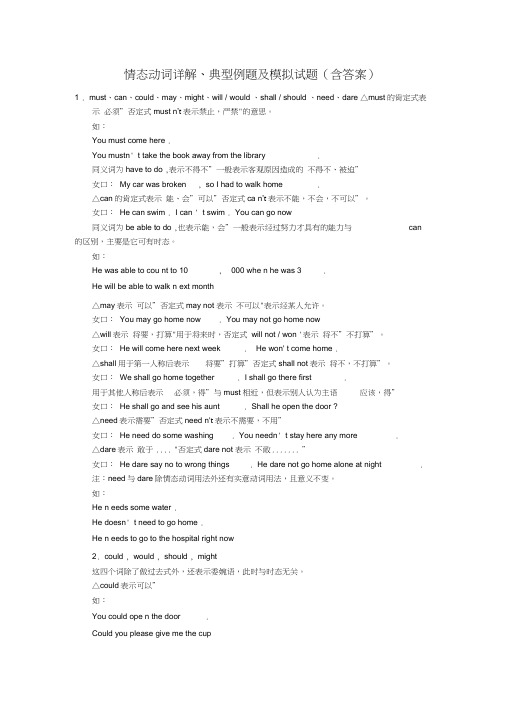
情态动词详解、典型例题及模拟试题(含答案)1 . must、can、could、may、might、will / would 、shall / should 、need、dare △must的肯定式表示必须”否定式must n't表示禁止,严禁"的意思。
如:You must come here .You mustn' t take the book away from the library .同义词为have to do ,表示不得不”一般表示客观原因造成的不得不、被迫”女口:My car was broken , so I had to walk home .△can的肯定式表示能、会”可以”否定式ca n't表示不能,不会,不可以”。
女口:He can swim . I can ' t swim . You can go now同义词为be able to do ,也表示能,会”一般表示经过努力才具有的能力与can 的区别,主要是它可有时态。
如:He was able to cou nt to 10 , 000 whe n he was 3 .He will be able to walk n ext month△may表示可以”否定式may not 表示不可以"表示经某人允许。
女口:You may go home now . You may not go home now△will表示将要,打算"用于将来时,否定式will not / won '表示将不”不打算”。
女口:He will come here next week . He won' t come home .△shall用于第一人称后表示将要”打算”否定式shall not表示将不,不打算”。
女口:We shall go home together . I shall go there first .用于其他人称后表示必须,得”与must相近,但表示别人认为主语应该,得”女口:He shall go and see his aunt . Shall he open the door ?△need表示需要”否定式need n't表示不需要,不用”女口:He need do some washing . You needn' t stay here any more .△dare表示敢于.... "否定式dare not 表示不敢....... ”女口:He dare say no to wrong things . He dare not go home alone at night .注:need与dare除情态动词用法外还有实意动词用法,且意义不变。
英语情态动词含答案解析
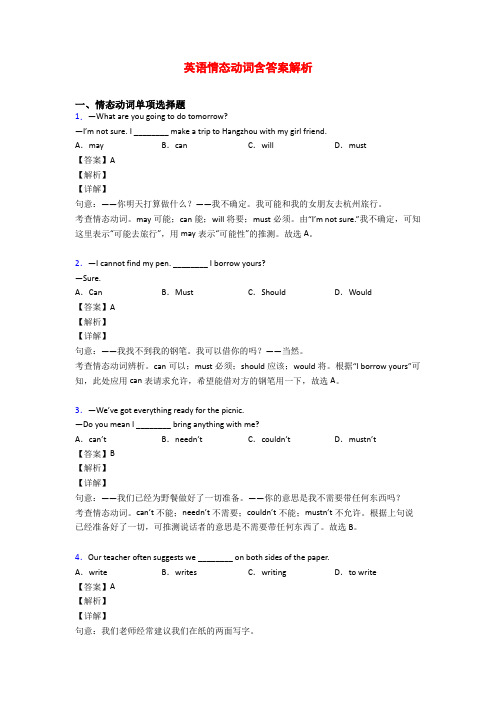
英语情态动词含答案解析一、情态动词单项选择题1.—What are you going to do tomorrow?—I’m not sure. I ________ make a trip to Hangzhou with my girl friend.A.may B.can C.will D.must【答案】A【解析】【详解】句意:——你明天打算做什么?——我不确定。
我可能和我的女朋友去杭州旅行。
考查情态动词。
may可能;can能;will将要;must必须。
由“I’m not sure.”我不确定,可知这里表示“可能去旅行”,用may表示“可能性”的推测。
故选A。
2.—I cannot find my pen. ________ I borrow yours?—Sure.A.Can B.Must C.Should D.Would【答案】A【解析】【详解】句意:——我找不到我的钢笔。
我可以借你的吗?——当然。
考查情态动词辨析。
can可以;must必须;should应该;would将。
根据“I borrow yours”可知,此处应用can表请求允许,希望能借对方的钢笔用一下,故选A。
3.—We’ve got everything ready for the picnic.—Do you mean I ________ bring anything with me?A.can’t B.needn’t C.couldn’t D.mustn’t【答案】B【解析】【详解】句意:——我们已经为野餐做好了一切准备。
——你的意思是我不需要带任何东西吗?考查情态动词。
can’t不能;needn’t不需要;couldn’t不能;mustn’t不允许。
根据上句说已经准备好了一切,可推测说话者的意思是不需要带任何东西了。
故选B。
4.Our teacher often suggests we ________ on both sides of the paper.A.write B.writes C.writing D.to write【答案】A【解析】【详解】句意:我们老师经常建议我们在纸的两面写字。
(完整版)情态动词用法及其练习与答案
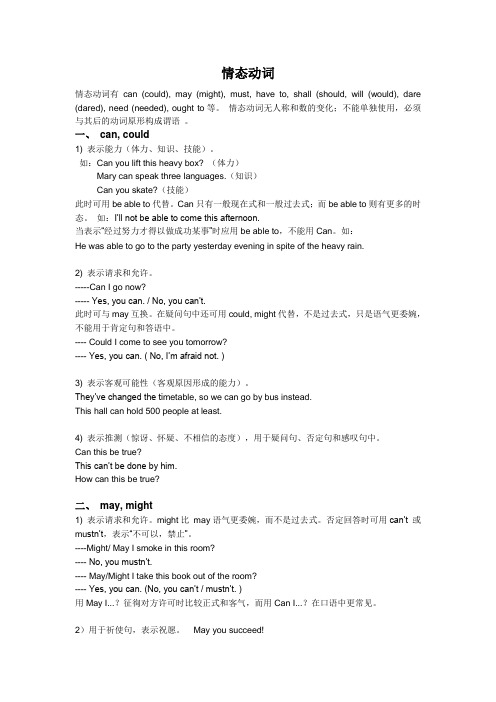
情态动词情态动词有can (could), may (might), must, have to, shall (should, will (would), dare (dared), need (needed), ought to等。
情态动词无人称和数的变化;不能单独使用,必须与其后的动词原形构成谓语。
一、can, could1) 表示能力(体力、知识、技能)。
如:Can you lift this heavy box? (体力)Mary can speak three languages.(知识)Can you skate?(技能)此时可用be able to代替。
Can只有一般现在式和一般过去式;而be able to则有更多的时态。
如:I’ll not be able to come this afternoon.当表示“经过努力才得以做成功某事”时应用be able to,不能用Can。
如:He was able to go to the party yesterday evening in spite of the heavy rain.2) 表示请求和允许。
-----Can I go now?----- Yes, you can. / No, you can’t.此时可与may互换。
在疑问句中还可用could, might代替,不是过去式,只是语气更委婉,不能用于肯定句和答语中。
---- Could I come to see you tomorrow?---- Yes, you can. ( No, I’m afraid not. )3) 表示客观可能性(客观原因形成的能力)。
They’ve changed the ti metable, so we can go by bus instead.This hall can hold 500 people at least.4) 表示推测(惊讶、怀疑、不相信的态度),用于疑问句、否定句和感叹句中。
【英语语法】情态动词can的用法(附练习及答案)
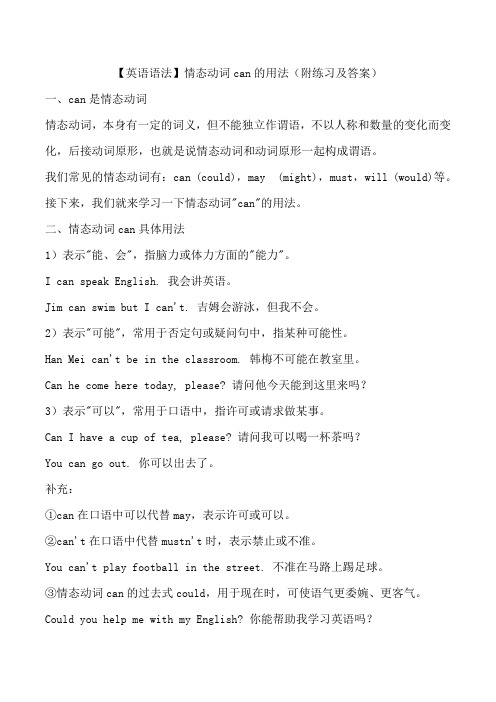
【英语语法】情态动词can的用法(附练习及答案)一、can是情态动词情态动词,本身有一定的词义,但不能独立作谓语,不以人称和数量的变化而变化,后接动词原形,也就是说情态动词和动词原形一起构成谓语。
我们常见的情态动词有:can (could),may (might),must,will (would)等。
接下来,我们就来学习一下情态动词"can"的用法。
二、情态动词can具体用法1)表示"能、会",指脑力或体力方面的"能力"。
I can speak English. 我会讲英语。
Jim can swim but I can't. 吉姆会游泳,但我不会。
2)表示"可能",常用于否定句或疑问句中,指某种可能性。
Han Mei can't be in the classroom. 韩梅不可能在教室里。
Can he come here today, please? 请问他今天能到这里来吗?3)表示"可以",常用于口语中,指许可或请求做某事。
Can I have a cup of tea, please? 请问我可以喝一杯茶吗?You can go out. 你可以出去了。
补充:①can在口语中可以代替may,表示许可或可以。
②can't在口语中代替mustn't时,表示禁止或不准。
You can't play football in the street. 不准在马路上踢足球。
③情态动词can的过去式could,用于现在时,可使语气更委婉、更客气。
Could you help me with my English? 你能帮助我学习英语吗?三、情态动词can的基本句型1)肯定句型为:主语+can+动词原形+其它。
They can play basketball. 他们能打篮球。
英语情态动词练习题含答案
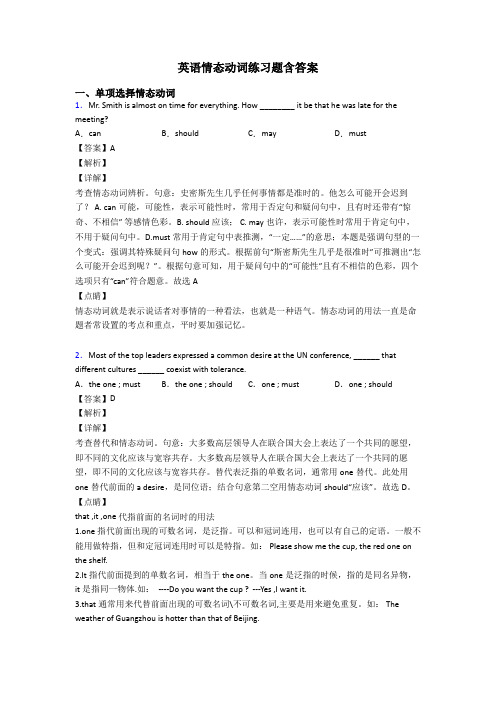
C.shouldD.will
【答案】B
【解析】
【详解】
考查情态动词。句意:——有一台计算机来储存照片真是太棒了。——不要过度依赖它。它有时候也会出故障,你最好做一个备份。计算机出故障这是可能的事情,表示客观可能性用can。must肯定,必须;should应该;will表意愿。故B选项正确。
11.-–Mary knows the city quite well.
--She______ well have been there before.
A.ne】D
【解析】
【分析】【详解】
考查情态动词辨析。句意:——Mary非常了解这个城市。——她肯定以前在那里呆过。may have done过去可能做过某事。表示对过去的肯定猜测。need have done本需要做某事却没做;could have done本可以做某事却没做;should have done本应该做某事却没做。故选D。
A.MayB.ShouldC.ShallD.Will
【答案】C
【解析】
【详解】
考查Shall的用法。句意:贝克先生,有些学生想见你。他们是在这里等还是在外面等?Shall用于第一、第三人称疑问句中,表示说话人征求对方的意见或向对方请示。故选C。
【点睛】
Shall的用法
Shall作为助动词,一般用于第一人称Ⅰ和We,表示一个将来的动作,构成将来时态。Shall后面接动词原形。例如:
【详解】
考查情态动词。句意:我们学校的校长最近通过了一项规定,要求学生在校园里穿校服。分析句子可知,“that students _______ wear school uniforms in our campus.”是同位语从句对名词“rule”内容解释说明。当表示强制,用于法令、条约、规章中,意为“必须,应该”等时句子用情态动词shall。故选D。
高中英语语法——情态动词总结(附带练习)

情态动词总结I 情态动词的特征:1.本身有词义。
2.不能独立作谓语。
2. 后接动词原形一起构成谓语。
3. 不随人称和数的变化。
II 情态动词各自的基本意义及用法:1.大多数情态动词(除表‘能力、许可、意志’外),都可以表示推测,其程度有差异。
按可能性程度的高低排列为:must﹥will ﹥would ﹥ought to ﹥should完全肯定完全可能很可能﹥can ﹥could﹥may ﹥might可能有可能2. 区分情态动词的否定含义:may not或许不、可能不might not可能不can’t 不可能mustn’t不许、禁止shouldn’t不应该needn’t 不必1.情态动词表推测的反意疑问句,简单来说,就是以情态动词后的时态为淮,如句子里有明确的时间状语,则以其为准。
2.以must 为例:E.g. 1. You must be hungry now, aren’t you?2. He must be watching TV , isn’t he ?3 Tom must have lived her for a long time, hasn’t he ?4. She must have arrived yesterday, didn’t she?注:如选择题中(以She must have arrived yesterday, didn’t she?为例)既有didn’t she又有hasn’t she则以didn’t she?为最佳答案。
IV 情态动词专项练习与解析一( ) 1. You _____ return the book now. You can keep it till next week if you like.A. can’tB. mustn’tC. needn’tD. may not( ) 2. Where is my pen? I _____ it.A. might loseB. would have lostC. should have lostD. must have lost( ) 3. I wish I _____ you yesterday.A. seenB. did seeC. had seenD. were to see( ) 4. I didn’t hear the phone. I _____ asleep.A. must beB. must have beenC. should beD. should have been( ) 5. If my lawyer _____ here last Saturday, he _____ me from going.A. had been; would have preventedB. had been; would preventC. were; would preventD. were; would have prevented( ) 6. He _____ you more help, even though he was very busy.A. might have givenB. might haveC. may have givenD. may give( ) 7. If it _____ for the snow, we _____ the mountain yesterday.A. were not; could have climbedB. were not; could climbC. had not been; could have climbedD. had not been; could climb( ) 8. Without electricity human life _____ quite difficult today.A. isB. will beC. would have beenD. would be( ) 9. A computer _____ think for itself, it must be told what to do.A. can’tB. couldn’tC. may notD. might not( ) 10. Jenny _____ have kept her word. I wonder why she changed her mind.A. mustB. shouldC. needD. would( )11. We _____ last night, but we went to the concert instead.A. must have studiedB. might studyC. should have studiedD. would study( ) 12. — Could I borrow your dictionary?— Yes, of course you _____.A. mightB. willC. canD. should( ) 13. Tom ought not to _____ me your secret, but he meant no harm.A. have toldB. tellC. be tellingD. having told ( ) 14. — If he _____, he _____ that food.— Luckily he was sent to the hospital immediately.A. was warned; would not takeB. had been warned; would not have takenC. would be warned; had not takenD. would have been warned; had not taken ( ) 15. Peter _____ come with us tonig ht, but he isn’t very sure yet.A. mustB. mayC. canD. will( ) 16. I told Sally how to get here, but perhaps I _____ for her.A. had to write it outB. must have written it outC. should have written it outD. ought to write it out( ) 17. I didn’t see your sister at the meeting. If she _____, she would have met my brother.A. has comeB. did comeC. cameD. had come ( ) 18. — Shall I tell John about it?—No, you _____. I’ve told him already.A. needn’tB. wouldn’tC. mustn’tD. shouldn’t ( ) 19. When a pencil is partly in a glass of water, it looks as if it _____.A. breaksB. has brokenC. were brokenD. had been broken( ) 20. It’s nearly seven o’clock. Jack _____ be here at any moment.A. mustB. needC. shouldD. can( ) 21.— There were already five people in the car but they managed to take me as well.— It _____ a comfortable journey.A. can’t beB. shouldn’t beC. mustn’t have beenD. couldn’t have been ( ) 22. Johnny, you _____ play with the knife, you _____ hurt yourself.A. won’t; can’tB. mustn’t; mayC. shouldn’t; mustD. can’t; shouldn’t ( ) 23. The fire spread through the hotel very quickly but everyone _____ get out.A. had toB. wouldC. couldD. was able to ( ) 24. — When can I come for the photos? I need them tomorrow afternoon.— They _____ be ready by 12:00.A. canB. shouldC. mightD. need( ) 25. — I stayed at a hotel while in New York.— Oh, did you? You _____ with Barbara.A. could have stayedB. could stayC. would stayD. must have stayed ( ) 26. — Will you stay for lunch?— Sorry, _____. My brother is coming to see me.A. I mustn’tB. I can’tC. I needn’tD. I won’t( ) 27. — Are you coming to Jeff’s party?—I’m not sure. I _____ go to the concert instead.A. mustB. wouldC. shouldD. might( ) 28. — Write to me when you get home.— _____.A. I mustB. I shouldC. I willD. I can( ) 29. I was really anxious about you, you _____ home without a word.A. mustn’t leaveB. shouldn’t have leftC. couldn’t have leftD. needn’t leave( ) 30. — Is John coming by train?— He should, but he _____ not. He likes driving his car.A. mustB. canC. needD. may专项练习(二)1. I didn’t see her in the meeting room this morning. She _____ at the meeting.A. mustn’t have spokenB. shouldn’t have spokenC. needn’t have spokenD. couldn’t have spoken2. One ought _____ for what one hasn’t done.A. not to be punishedB. to not be punishedC. to not punishedD. not be punished3. If you really want yourself to be in good health, you must ___ always ___ so much.A. not; be smokingB. not; have smokedC. not; to smokeD. be not; smoking4. With so much work on hand, you _____ to see the game last night.A. mustn’t goB. shouldn’t goC. couldn’t have goneD. shouldn’t have gone5. Most of the students felt rather disappointed at the English party. They say that it ______ better organized.A. had beenB. had to beC. must have beenD. could have been6. I’m surprised that he _____ in the exam.A. should failB. would have failedC. may have failedD. should have failed7. The little girl _____ there alone.A. not dare goB. dares not goC. dare not goD. dare not to go8. “Must we do it now?” “No, you _____.”A. won’tB. needn’tC. can’tD. don’t9. He said he would rather not _____ it right now.A. doingB. to doC. doD. to be doing10. You _____ to the meeting this afternoon if you have something important to do.A. needn’t to comeB. don’t need comeC. don’t need comingD. needn’t come11. Put on more clothes. You _____ be feeling cold with only a shirt on.A. canB. couldC. wouldD. must12. I _____ play football than baseball.A. would ratherB. had betterC. like betterD. prefer13. I thought you _____ like something to read, so I have brought you some books.A. mayB. mightC. couldD. must14. There was plenty of times. She _____.A. mustn’t have hurriedB. couldn’t have hurriedC. must not hurryD. needn’t have hurried15. The plant is dead. I _____ it more water.A. will giveB. would have givenC. must giveD. should have given16. You _____ return the book now. You can keep it till next week if you like.A. can’tB. mustn’tC. needn’tD. may not17. It’s still early, you _____.A. mustn’t hurryB. wouldn’t hurryC. may not hurryD. don’t have to hurry18. Please open the window, _____?A. can’t youB. aren’t youC. do youD. will you19. We _____ for her because she never came.A. mustn’t have waitedB. shouldn’t have waitedC. mustn’t waitD. needn’t wait20. — May I stop here? — No, you _____.A. mustn’tB. might notC. needn’tD. won’t21. It’s a fine day. Let’s go fishing, _____.A. won’t weB. will weC. don’t weD. shall we22. I didn’t see her in the meeting room this morning. She _____ at the meeting.A. mustn’t have spokenB. shouldn’t have spokenC. needn’t have spokenD. couldn’t have spoken23. — Please don’t make a noise. — _____. I’ll be as quiet as a mouse.A. Yes, I won’tB. No, I won’tC. No, I willD. Yes, I will24. The young man has made so much noise that he _____ not have been allowed to attend the concert.A. couldB. mustC. wouldD. should25. — Where is John? — He _____ in the library.A. should beB. must beC. can beD. must have been26. Since the road is wet this morning, _____ last night.A. it must rainB. it must be rainingC. it must have rainedD. it must have been rain27. — Will your brother stay home tonight?— I’m not quite sure. He _____ to the cinema tonight.A. must goB. can goC. may goD. may be going28. She’s already two hours late. What ______ to her?A. can have happenedB. may have happenedC. should have happenedD. must happen29. You must be a writer, _____?A. mustn’t youB. are youC. must youD. aren’t you30. I got up early that morning, but I _____ so because I had no work to do.A. mustn’t have doneB. didn’t need to doC. needn’t have doneD. can’t have done31. He _____ have come here yesterday, but he didn’t.A. couldB. shouldC. ought toD. all the above32. I missed the last bus, so I _____ go home on foot.A. mustB. have toC. mayD. had to33. He ought to win the first prize, _____ he?A. oughtn’tB. shouldn’tC. mustn’tD. both A and B34. Everyone _____ do his best for the modernizations of our country.A. canB. mayC. shouldD. might35. Let’s clean our classroom, _____?A. will youB. don’t weC. shall weD. do you36. Let us play basketball, ______?A. will youB. don’t weC. shall weD. do you37. He asked me for this book many times. Please tell him that he _____ have it tomorrow.A. mustB. mayC. shallD. both B and C38. “Your phone number again? I _____ quite catch it.” “It’s 9568442.”A. didn’tB. couldn’tC. don’tD. can’t39. Mother _____ us stories when we were children.A. was used to tellB. is used to tellingC. used to tellD. used to telling40. She would rather _____ more money on books _____ on clothes.A. cos t … notB. to spare … don’tC. pay … thanD. spend … than专项练习(三)1. — Has Li Lin started? He said he would join in the party.— He ______. He is a man of keeping his word.A. could have leftB. must have leftC. can’t comeD. won’t be c oming2. — May I park my car here?— No, you ______. No car is allowed to park here.A. may notB. needn’tC. mustn’tD. daren’t3. — Excuse me, could you tell me where the Yajia Supermarket is?—It’s two blocks straight ahead. You ______ miss it.A. mustn’tB. can’tC. needn’tD. shouldn’t4. — I saw Mr. Sun at Tongyu Station this morning.—You ______. He’s still on holiday in Hawaii.A. couldn’t haveB. mustn’t haveC. shouldn’tD. needn’t5. — How about paying a visit to Dr. Wang, our former Chinese teacher?— Good idea. I will e-mail him today so that he ______ know ______ to expect us.A. shall; whyB. could; whenC. would; whatD. will; how6. Everything has two sides. Beautiful songs, sometimes, ______ be just noise to others.A. mustB. mayC. shouldD. could7. Someone ______ my umbrella. I found it wet yesterday.A. must be usingB. must have usedC. must useD. must have been using8. — How dangerous it was!— Yes, but for the passer-by’s quick action, th e girl ______.A. was drownedB. could have been drownedC. had drownedD. should be drowned9. You ______ scold such a pupil who always keeps silent so seriously that you ______ hurt him.A. should; canB. may; willC. mustn’t; mayD. can’t; must10. — Why does Alice know so much about Angkor Wat?— She ______ have been there, or ...A. mustB. oughtn’t toC. mayD. can’t11. —You may laugh, but I’ve been thinking of becoming a vegetarian.— Oh, you ______ be crazy. You will be hungry all the time.A. mustB. mayC. willD. need12. —What’s the matter with you?—Oh, I’m not feeling well in the stomach. I ______ so much fried fish just now.A. shouldn’t eatB. mustn’t have eatenC. shouldn’t have eatenD. mus tn’t eat13. — ______ he have been chosen as captain of the football team?— Yes, he ______.A. Can; must haveB. Must; must haveC. Can; mustD. Must; must14. Mr. Zhang ______ in Shanghai tomorrow morning.A. can have arrivedB. will have arrivedC. may have arrivedD. must have arrived15. Miss Wang started at 8 o’clock, and she ______ be there now.A. shouldB. canC. can’tD. need16. — It must be Mr. Li who did it. — No, it ______ be Mr. Li.A. mustn’tB. wouldn’tC. can’tD. may17. You ______ finish reading the book as soon as possible.A. mayB. canC. needD. should18. — Need you go to work now? — Yes, I ______.A. mustB. needC. canD. dare19. Your trousers are dirty. ______ them for you?A. Shall I washB. Will I washC. Am I going to washD. Am I washing情态动词专项练习与解析一【练习解析】1.C 从原题中You can keep it till next week if you like这一信息句可知,“你不必现在还”。
- 1、下载文档前请自行甄别文档内容的完整性,平台不提供额外的编辑、内容补充、找答案等附加服务。
- 2、"仅部分预览"的文档,不可在线预览部分如存在完整性等问题,可反馈申请退款(可完整预览的文档不适用该条件!)。
- 3、如文档侵犯您的权益,请联系客服反馈,我们会尽快为您处理(人工客服工作时间:9:00-18:30)。
情态动词讲解定义:情态动词表示说话人对动作的态度,比如:需要,可能,意愿,猜测或者怀疑等等。
情态动词本身有一定意思,但不完全,不能单独作谓语,必须与动词原形连用。
否定句中,在情态动词后面加not。
情态动词有:must, shall, should, had better 词形无变化can(could), may(might), will(would) 词形有变化need既可以是情态动词,也可以是实义动词,具有双重性。
一、can 表示“能,会”,否定为:can’t = can not = cannot其过去式为:could→couldn’t(1)表示会做某事,有能力做某事。
意思= be able toe.g. He can speak English, but he can’t speak Japanese.= He is able to speak English, but he isn’t able to speak Japanese.I could smile but I couldn’t speak w hen I was 2 months old.= I was able to smile but I wans’t able to speak when I was 2 months old.区别:① can只用于现在时和过去时(could), be able to 可用于各种时态。
e.g. They will be able to tell you the news soon.Mingming has been able to count numbers.② be able to 不与can连用,但可以和其他情态动词或助动词连用。
e.g. He may be able to speak English very well some day in the future.He may can speak…………………………………………………..He can be able to speak……………………………………………..(2)用于征求意见——Can /Could /May /Might I(we) do sth?——Yes, you can/may. / Of course you can.——No(Sorry), you can’t. /mustn’t.注意:①此处的could和might都不表示过去,只是语气上的委婉,不用作回答。
②否定回答中,表示对他人造成一定伤害或影响,或表示违反了某种规定或法律时,用mustn’t较好。
e.g. ——Could I take the book out of the library? ——Sorry, you mustn’t.——May I smoke here? ——I’m afraid you mustn’t.③表示过去能力时,could 提问,只能用could回答。
e.g. ——Could you ride a bike when you were 4 years old? ——No, I couldn’t.(3)表提出意见或请求Can/Could you (please) do sth? = Would you (please) do sth? (此句型中some 不变any)e.g. Could you please give me a hand?Would you please pass me some salt?(4) 表示允许或承诺=maye.g. OK. You can /may come and find me at any time tomorrow.(5) 表示有一定把握的推测,用于否定句和疑问句。
肯定句用must。
表示没有把握的推测,用may /might。
e.g. —— The window is broken. Who did it?—— It may be Mary.——It can’t be Mary. The window is in the men’s toilet.—— Can it be anyone else?—— Then, it must be Bob. I saw him go into the toilet just now.二、may 表示“可以,可能”,否定形式may not(1) 表示没有把握的推测,“可能,也许”。
e.g. He may have a lot of work to do. = Maybe he has a lot of work to do.You may be right. = Maybe you are right.(2) 表示请求“我可以……吗?”表示许可“你可以……” e.g. You may /can go now.——May I use your pen?——Yes, you may. / Yes, please. / Go ahead.——No, you can’t. / mustn’t.三、must 表示“必须,肯定,一定”,否定形式mustn’t = must not(1) 表示必须,意思同have toe.g. ——Must I do it now?——Yes, you must.——No, you don’t have to. / No, you needn’t. (注意:否定回答不用mustn’t)Children mustn’t play on the road because it’s too dangerous. (mustn’t只表“禁止”)He doe sn’t have to go away from here.=He needn’t leave here.区别:①must表达主观意愿的“必须”,have to表达客观上或按道理说“不得不”。
e.g. I must study hard.It’s too late. I have to go now.②must 没有人称和时态的变化,而have to有。
e.g. He had to walk back home because he lost all his money.Mom will be away for a week, so we will have to do the cooking by ourselves.(2) 表示有把握的肯定句中的推测,“肯定,一定”,见“一、(5)”四、need 表示“需要”,否定形式needn’t = need not(1)作情态动词,仅用于否定句和疑问句。
e.g. He needn’t go home early yesterday. = He didn’t need/have to go home early yesterday.Need I call him right now? ——Yes, you must.(注意:肯定回答不用need)——No, you needn’t. /No, you don’t have to.(2)作实义动词,need sth./sb.need to do sth. 否定形式don’t need to = don’t have to 表示“不必”e.g. I need some help.He needed to go home early yesterday.Do I need to call him right now? ——Yes, you do. / ——No, you don’t.(3) need 作名词be in (great) need of sth = need sth (badly) “非常需要某物”meet the need “满足需要(需求)”there is/was no need (for sb) to do sth “某人没必要做某事”五、should 表示“应该”,否定形式shouldn’t = should note.g. We should try our best to help the poor little girl.You shouldn’t be lazy.六、had better do表示“最好是做……”,否定形式had better not doe.g. You’d better not drink so much coffee.区别:It’s better for you to do more exercise and not to have so much junk food.七、would 表示意愿常见句型:①表请求Would you please do…? ——OK…. / Sorry, ….②Would you like sth? ——Yes, please. / No, thanks.Would you like to do sth? ——I’d love to.——I’d love to, but….(注意:以上句型中,some不变any)情态动词精选练习1. _____ I go out to play now,Mum? No,you______ .A.May,shouldn’t B.Can,needn’tC.Must,can’t D.May.mustn’t2. Help me with this case._______ you?A.don’t B.will C.do D.shall3. They started early that morning in order that they______ there before noon.A.might get B.may get C.would get D.got4. A teacher do every exercise,but a pupil________.A.needn’t,must B.may not,must C.needn’t, needn’t D.can’t, must 5. If you _____ do as I tell you,you______ go to the party.A.can,shan’t B.will, won’t C.won’t,shall D.won’t, shan’t A.will B.would C.do D.can7. Don’t believe him.His story ______ be true.A.mustn’t B.needn’t C.shouldn’t D.may not8. ---She must have gone back to the valley.---No, she ____ . The entrance to it was nowhere to be found.A.mustn’t B.needn't C.couldn’t D.hadn’t9. You need not do it at once,________?A.needn’t you B.mustn’t youC.don’t you D.need you10. He must be in the classroom.______ he?A.mustn’t B.can’t C.isn’t D.Can11. Let’s go to the library.shall we? ________.A.No,I can’t B.Yes.I will C.Yes,thank you D.No,We’d better not 12. You ought to have called him yesterday.Yes, I know I_______.A.ought to B.ought to haveC.ought to have done D.ought to have called13. ---Why did you keep it a secret from me?---I ____ about it.A.should be told B.ought to have been toldC.should have told D.ought to be told14. The work _______ be finished in such a short time.A.wasn’t able to B.couldn’t C.ought D.could15. He looks very tired.He ____ to bed too late last night.A.must go B.must have gone C.could go D.didn’t go16. The door ______ lock.A.can’t B.may not C.won’t D.mustn’t17. As a soldier,you ______ do as the head tells you.A.will B.shall C.may D.ought18. How _____ you be so careless?A.can B.will C.could D.may19. I talked for a long time,and in the end I____ make her believe me.A.could B.can C.must D.was able to20. Did you scold him for carelessness ? Yes,but _____ it.A.I’d rather not do B.I’d rather not have doneC.I shouldn’t do D.I’d better n ot do21. He needn’t come to attend the meeting._______ ?A.didn’t he B.doesn’t he C.need he D.must he22. Fish _______ die without water.A.will B.should C.shall D.must23. We’d better hurry.Our teacher _________ us.A.wait for B.must wait forC.must be waiting for D.has waited for24. I saw him leave the room an hour ago.He ______ at this time.A.mustn’t be working B.can’t be workingC.can’t work D.may not being working25. ______ basketball every day?A.Did you used to playing B.Did you use to playC.Use you to play D.Used you play26. Why______ you keep on troubling me with such questions while I am busy ?A.could B.can C.must D.will27. ---You were driving at 100km an hour, sir.---But officer,I____ ,my car can’t go more than 90.A.may not have been B.couldn’t have beenC.would have been D.needn’t have been28. You ______ call him if you want to,but you______ ,for he’ll surely come here soon.A.can,needn’t B.may, mustn’tC.have to,needn’t D.can, doesn’t need29. At last he _____ finish the work ahead of time.A.could B.was able toC.could have done D.would have been able to30. There must be some enemy soldiers in the forest._______ any behind the church?A.Must there be B.Should there be C.May there be D.Can there be 31. The shy girl____ dance before so many strangers,______she?A.daren’t,does B.daren’t,dare C.doesn’t,dare D.dare not.Dares 32. “When ___ he leave the hospital?” I asked the doctor.A.will B.shall C.can D.may33. ---They haven’t finished the work up to now.---Well,they______.A.should have B.should C.ought to D.ought have34. The money was soon spent,so she ______ go hungry.A.must B.had to C.might D.Should35. Jack studied hard and _______ pass the examination.A.could able to B.would C.was able to D.ought36. You don’t look well,you _______ have a fever.A.might B.can C.shall D.should37. You are running a fever,you _____ to see the doctor.A.need go B.must have gone C.should go D.can go38. I ______ take the job.No one ____ stop me.A.will,can B.can,must C.must,can D.will, must39. There used to be a high tower here,______ ?A.was there B.wasn’t there C.used there D.usedn’t there 40. Whenever the teacher was not there, the children _______ make a lot of noise.A.will B.would C.were to D.were going to41. He must be shy, _______ he?A. A.must B.mustn’t C.is D.isn’t42. I must do it, ________ I?A.do B.don’t C.must D.mustn’t43. You did not go to the party yesterday, or I ___ you.A.would see B.could meet C.might have seen D.might see 44. ---How do you like the food here?---Oh,excellent! We ______ a better hotel.A.can’t find B.won’t findC.mustn’t have found D.couldn’t have found45. ---We were waiting for you this time yesterday.---Sorry,I ______ you to tell you that I couldn’t come.A.must have called B.would have been callingC.could have been calling D.should have called46. ---Would you mind returning the book tomorrow?---______.A.Ok,I will B.Sure, I wouldn’tC.Yes,I wouldn’t D.Why, I wouldn’t47. See who’s t here! _____ it be Mary?A.May B.Must C.Can D.Will48. My little son ______ out a1one at night.A.dares not go B.dares not to goC.dare not to go D.doesn’t dare to go49. You ______ miss seeing so good a film,i t is one of the best films I’ve ever seen.A.had better not to B.have better not toC.had better to not D.had better not50. It is strange that she _______ so.A. think B.thinks C.will think D.thought51. _______ you rather sit at the back?A.Won’t B.Wouldn’t C.Don’t D.Will52. ---Where______?---She ______ to school, for it is Sunday today.A.can she go,can’t go B. may be go,may not goC.can she have gone, can’t hav e gone D.can she go,can’t have gone 53. Since she is angry, we _____.A.had better to leave her alone B.should leave her alone C.might as well leave her alone D.must leave her alone54. ---Do you think he will do me a favour?---It’s very unlikely,but he ____ be prepared to help you.A.must B.will C.can D.Might55. Will you sing a song at the party? No, I_________.A.wouldn’t B.won’t C.shouldn’t D.shall not56. My brother used to get up early in the morning,but my sister seldom ______.A. used toB. didC. usedD. both A and B57. ---Will it be raining this afternoon?---No,I’m afraid it_____.A.may not B.won’t C.mustn’t D.shouldn’t58. You _____ in such a hurry,I’ll have the car waiting for you.A.don’t need being B.don’t have beenC.need not to be D.needn’t be59. I have kept the book for 3 weeks.I _______ them to the library last week.A.ought return B.ought to returnC.ought have returned D.ought to have returned60. ---______ I get you some food?---No.thanks.A. A.MightB. ShallC. WillD. Ought中考考点情态动词练习1. -Mum,may I watch TV now?-Sure,but you ________ help me with my English.A. canB. mayC. mustD. could2. -________ I download the article again?-No,you needn't.A. ShallB. WillC. MustD. Can3. -Can you go skating with us this afternoon?-Sorry,I can't. I ________ take care of my little sister at home.A. canB. mayC. wouldD. have to4. -Must I hand in my exercise book today?-No,you ________.A. can'tB. needn'tC. mustn'tD. won't5. -May I have a word with you?-No,you ________. I'm busy today.A. needn'tB. wouldn'tC. don't have toD. can't6. -________I have your English name,please?-Yes,Helen. H-E-L-E-N.A. MustB. MayC. WillD. Need7. -Who is the boy over there?Is it John?-No,it ________ be him. John is much taller.A. mustn'tB. may notC. can'tD. needn't8. -Can you play Frisbee,Jay?-Yes,I ________. It's easy.A. mustB. canC. needD. may9.-You must come back every month. -Yes,I ________.A. willB. mustC. shouldD. can10. She ________ know the answer,but I'm not sure.A. maybeB. may beC. mayD. must11. - Must we clean the room right now?- No,you. You clean it after lunch.A. needn't;mayB. needn't;mustC. Mustn't;canD. mustn't;may12. John________ come to see us tonight,but he isn't very sure yet.A. mayB. canC. has toD. must13. Children ________ play with fire.A. mustn'tB. can'tC. shouldn'tD. needn't14. -________ I come in,Mr Green?-Yes,come in,please.A. MustB. NeedC. WillD. May15. -Must I finish the work today?-No,you ________. You ________ finish it tomorrow.A. mustn't;mayB. can't;canC. needn't;mayD. needn't;must1-5 DBAAD 6-10 ADCDC 11-15 DBBBB 16-20 CBADB 21-25 CACBB 26-30 CBABD 31-35 BBABC 36-40 ACADB 41-45 DDCDD46-50 DCDDA 51-65BCCDB 56-60DADDB1. C.这组对话的意思是:"妈妈,我现在可以看电视吗?""当然,但你必须帮我学英语。
